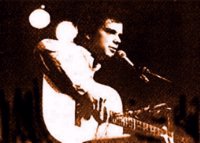Leo Kottke's New Guitar Music Finds Him at the Top of His Form
by Joel Vance
 |
In 1972 I heard my first Leo Kottke album and nearly fell on the floor. He was playing what I had always wanted to play on both the mighty twelve-string and the standard acoustic guitar -- expect, of course, his musical ideas were much better than mine and his technical skills were exceptional.
From the early Seventies until 1976, Kottke recorded for Capitol, always using the Sound 80 studio in Minneapolis near his home. He turned out a series of topflight albums, all produced by Denny Bruce. His uptempo instrumentals, with their abrupt changes and sudden injections of syncopation, were delight-filled surprises; his slower compositions were poignant, brooding, and prodigal in their exploration of tonality.
But in 1976 something changed: Kottke seemed to [be] running out of ideas or was perhaps becoming bored. His uptempo and "ballad" material seemed forced in both conception and execution. He moved to Chrysalis Records, where his first album included orchestral backing, a prop he had never used before. The albums that followed, Burnt Lips and Balance, were plodding and morose, although Balance, produced by Kenneth Buttrey, showed a few signs of life. In addition, Kottke's composing talents were in limbo, and he tended to sing more to fill the gap. Unfortunately, his singing doesn't begin to approach the quality of his instrumental work (his baritone is more resolute than flexible, but it doesn't deserve quite the critical pounding it has received).
But now for the good news. Kottke's term of trial has passed, and the all-instrumental Guitar Music reveals him as once again confident, assured, and at the top of his form as both artist and producer. The startling rhythms in such uptempo pieces as "Part Two" are played with a happy mastery, while "Strange" is a beguiling mixture of rhythms complete with fiery swoops, delicate harmonics, and those quirky, lovely, teasingly incomplete melodies of his. Then there is "A Song for 'The Night of the Hunter'." It is based on the eerily brilliant 1947 film (directed by Charles Laughton) about two children fleeing a homicidal backwoods preacher (Robert Mitchum). Superbly photographed, the film packs a real emotional wallop, and even if you've never seen it, I think you'll find a good deal of its chill evoked in Kottke's musical gloss.![]()
His altered-perspective versions of other musicians' material have always been interesting, and here he throws new light on Ry Cooder's "Available Space", that old chestnut "Tumbling Tumbleweeds," Boudleaux Bryant's "All I Have To Do Is Dream" (made famous by the Everly Brothers), and "Sleep Walk," a 1950s instrumental hit by Santo & Johnny. Kottke's treatments of them are like his own music: rich and robust. [The End]